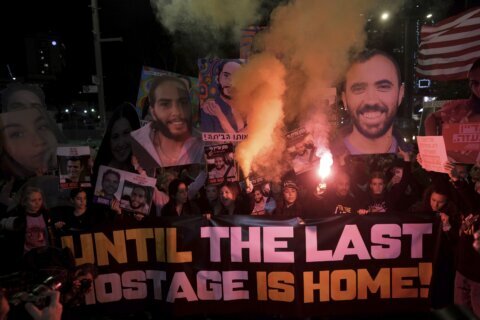NEW YORK (AP) — The father of the victim at the center of the fatal New York City subway chokehold trial has sued the defendant as a Manhattan jury continued to deliberate the case Thursday.
Jordan Neely ’s father, Andre Zachary, filed the suit Wednesday against Marine veteran Daniel Penny in New York Supreme Court.
He accuses the Long Island native of negligence, assault and battery, which led to the death of his unarmed, 30-year-old son on May 1, 2023, on an underground train.
The then-24-year-old Penny placed Neely in a chokehold for about six minutes after Neely, who was homeless, began shouting and acting erratically on the crowded train.
Zachary is seeking a judgment awarding damages “in a sum which exceeds the jurisdictional limits of all lower Courts which would otherwise have jurisdiction,” according to the lawsuit.
Penny’s lawyer Steven Raiser dismissed the suit as a distraction.
“The timing is unfortunate as Danny is awaiting a verdict from the jury where the potential consequences are far greater than any civil suit could threaten,” he said in a statement Thursday, adding that Penny had not yet been served the complaint. “We will not be distracted by this attempt to attack Danny while he is under such tremendous stress.”
Lawyers for Zachary didn’t respond to an email seeking comment. But Christopher Neely, Jordan’s uncle, repeated the family’s position that Neely didn’t deserve to die over his tirade.
“What gave Daniel Penny the right to choke Jordan nearly for six minutes?” he said outside the courthouse. “He had an option to go to another car. He had the option to say something and not do nothing.”
The third day of deliberations ended Thursday without a verdict.
The jury, which resumes its closed-door discussions Friday, heard a readout of a city medical examiner’s testimony during the monthlong trial.
They also asked the judge to re-read the criminal definitions of recklessness and negligence in open court and be provided with written copies of the statutes.
Jurors relistened to Dr. Cynthia Harris’ testimony about issuing a death certificate for Neely after conducting an autopsy and reviewing the bystander’s video and investigative findings.
Penny’s defense focused, in large part, on challenging the city medical examiner’s office’s determination that the chokehold killed Neely.
A defense pathologist testified Neely died from using synthetic marijuana, also known as “K2,” along with schizophrenia, a genetic condition and his struggle with Penny.
On Wednesday, jurors asked to review the police and bystander video, including the responding officers’ body camera videos and police video of Penny’s subsequent station house interview with detectives.
Penny has pleaded not guilty to manslaughter and criminally negligent homicide.
Prosecutors say he recklessly squeezed Neely’s neck too hard and for too long, but Penny’s lawyers maintain his actions were justified in protecting fellow subway riders.
Penny and some passengers recalled Neely had ranted about being willing to die, willing to go jail — even willing to kill.
The case has been a flashpoint in long-simmering debates over race relations, public safety, homelessness and mental illness.
Some have cast Penny as a valiant protector while others view the now 26-year-old architecture student as a white vigilante who summarily killed a troubled Black man in need of help.
___
Follow Philip Marcelo at twitter.com/philmarcelo.
Copyright © 2025 The Associated Press. All rights reserved. This material may not be published, broadcast, written or redistributed.







